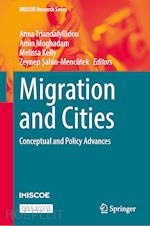
Questo prodotto usufruisce delle SPEDIZIONI GRATIS
selezionando l'opzione Corriere Veloce in fase di ordine.
Pagabile anche con Carta della cultura giovani e del merito, 18App Bonus Cultura e Carta del Docente
This open access book brings together different perspectives on migration and the city that are usually discussed separately, to show the special character of the urban context as a territorial and political space where people coexist, whether by choice or necessity. Drawing on heterogeneous situations in cities in different world regions (including Europe, North America, the Middle East, South, Southeast and East Asia and the Asia Pacific) contributions to this volume examine how migration and the urban context interact in the twenty-first century. The book is structured in four parts. The first looks at cities as hubs of cultural creativity, exploring the many dimensions of cultural diversity and identity as they are negotiated in the urban context. The second focuses on what lies outside the large urban centres of today, notably suburbs, while the third part engages with migration and diversity in small and mid-sized cities, many of which have adopted strategies to welcome growing numbers of migrants. Last but not least, the fourth part looks at the challenges and opportunities that asylum-seeking and irregular migration flows bring to cities. By providing a variety of empirical cases based on various world regions, this book is a valuable resource for researchers, students and policy makers.
Chapter 1. Migration and Cities: An Introduction.- Part I: Emerging and Established Global Cities: Managing Diversity from Above and from Below.- Chapter 2. Governing Diversity Beyond City and State: Epistemic and Ethical Challenges of African Urbanisation.- Chapter 3. Urban Policy Modelling and Diversity Governance in Doha and Singapore.- Chapter 4. Urban Diversity and Spatial Justice: A Critical Overview.- Part II: Migration and Diversity Outside the Urban Core: Small and Mid-sized Cities.- Chapter 5.- Multi-level Migration and Multiculturalism Governance Meets Migrant and Refugee Agency in Regional Australian Towns.- Chapter 6. Immigration Policy and Less-Favoured Regions and Cities: Comparing Urban Atlantic Canada and the US Rust Belt.- Chapter 7. New Zealand’s Small-Town Disruptions and the Role of Immigrant Mobilities.- Chapter 8.- Reflections on ‘Welcoming’ Second- and Third-tier Cities in Canada, Australia, New Zealand, and the United States.- Part III: Migration and Diversity Dynamics in the Suburbs.- Chapter 9. Suburbanisation and Migrant Entrepreneurship in the United States.- Chapter 10. Stuck in the Suburbs? Socio-Spatial Exclusion of Migrants in Shanghai.- Chapter 11. Settlement and Rental Housing Experiences Among Recent Immigrants in the Suburbs of Vancouver: Burnaby, Richmond, and Surrey.- Chapter 12. Suburban Migration: Interrogating the Intersections of Global Migration and Suburban Transformation.- Part IV: Bordering Migration in Cities.- Chapter 13. The Urbanisation of Asylum.- Chapter 14. ‘Urban-itarian’ Ecologies in Lebanon, Turkey and Jordan After Displacement from Syria.- Chapter 15. Sheltering Extraction: the Politics of Knowledges Transitions in the Context of Shelter Organisations in Mexico and the Netherlands.- Chapter 16. Temporality and Permanency in the Study of Border Cities and Migration.
Melissa Kelly is Research Fellow, CERC Migration, Ryerson University, Canada. She was a Research Associate at the Institute for Housing and Urban Research in Uppsala and a Postdoctoral Fellow with the Borders in Globalization project at Carleton University. She holds a PhD in social and economic geography from Uppsala University in Sweden. Her research interests include comparative immigration policy, the social and economic integration of immigrants, and immigration to rural and remote areas. She is currently looking at the factors influencingimmigrant retention in small and medium-sized cities in British Columbia, Saskatchewan and Ontario.
Amin Moghadam is Senior Research Associate, CERC Migration, Ryerson University, Canada. He holds a PhD in human geography and urban studies from the Lumière Lyon 2 University. His research and publications have focused on migration policy and practices, diaspora studies, and circulation and regional integration in the Middle East, with a focus on the Persian Gulf region (Iran and United Arab Emirates). Amin acted as Associate Research Scholar at the Center for Iran and Persian Gulf Studies at Princeton University between 2016 and 2020. Prior to this position, he was a Lecturer at Sciences Po Paris, Aix-Marseille University, and at the Institut National des Langues et Civilisations Orientales. Amin’s current research explores ways in which the dynamics of space production in global cities intersect with the politics of housing and home making and the role both forces play in migration trajectories, transnational practices, and class formation in the host society.
Zeynep S. Mencütek is Senior Researcher at the Bonn International Center for Conflict Studies, Germany, where she leads a comparative project on return and reintegration. She is also Research Affiliate with CERC Migration, Ryerson University, conducting joint research on transnational governance of migration. She held the prestigious Alexander von Humboldt Research Fellowship for Experienced Researchers (June 2020–May 2021) and an international fellowship at the Centre for Global Cooperation Research in Duisburg (2019–2020). She also served as Senior Researcher for the Horizon 2020 project RESPOND: Multilevel Governance of Mass Migration in Europe and Beyond. Previously, she served as an Assistant Professor in Turkey, and in 2018 achieved the rank of Docent in the field of international relations. Her research examines the governance of migration, return migration, diaspora politics and Middle Eastern politics. She received her PhD in politics and international relations from the University of Southern California in 2011.











Il sito utilizza cookie ed altri strumenti di tracciamento che raccolgono informazioni dal dispositivo dell’utente. Oltre ai cookie tecnici ed analitici aggregati, strettamente necessari per il funzionamento di questo sito web, previo consenso dell’utente possono essere installati cookie di profilazione e marketing e cookie dei social media. Cliccando su “Accetto tutti i cookie” saranno attivate tutte le categorie di cookie. Per accettare solo deterninate categorie di cookie, cliccare invece su “Impostazioni cookie”. Chiudendo il banner o continuando a navigare saranno installati solo cookie tecnici. Per maggiori dettagli, consultare la Cookie Policy.